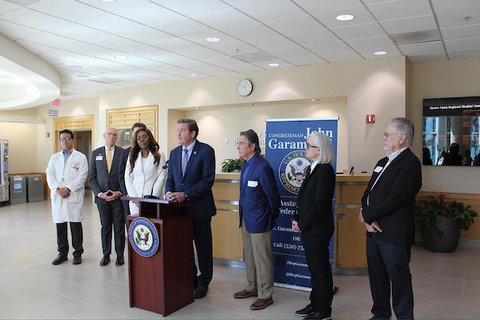
29 Aug Rep. Garamendi Warns Constituents They Could Lose Health Care, Food Assistance After Federal Cuts

U.S. Rep. John Garamendi, D-Fairfield, cautions constituents in a press event Thursday at Contra Costa Regional Medical Center, in Martinez that cuts to health care spending could lead to longer wait times and delayed care after cuts enacted by the recently passed federal spending legislation H.R. 1 take effect. (U.S. Rep. John Garamendi’s office via Bay City News)
By Thomas Hughes
Bay City News
Health care and food assistance providers in Contra Costa County spoke out Thursday against local impacts projected from the recently passed Republican spending bill they say will be devastating to residents who rely on those services.
U.S. Rep. John Garamendi, D-Fairfield, joined leaders at separate events at Contra Costa Regional Medical Center and the Food Bank of Contra Costa and Solano calling for a reversal of the cuts outlined in the so-called One Big Beautiful Bill.
The bill, legally known as House Resolution 1, cut health care spending by about $1 trillion in combined reductions to Medicaid, Medicare and Affordable Care Act subsidies and cut funding for food assistance funding by about $187 billion, or 20%, over the next 10 years, according to analyses by the Kaiser Family Foundation, a nonprofit research organization unaffiliated with health care provider Kaiser Permanente, and the nonpartisan Center on Budget and Policy Priorities.
>>>Experts Warn ‘Big Beautiful Bill’ Could Bring Harm to Health, Climate and Economy<<<
The nonpartisan California Budget and Policy Center estimated that about 160,000 residents in Garamendi’s district were at risk of losing health care through Medicaid, which operates as Medi-Cal in California. It also projected about 18,000 residents, including 13,000 with children, could lose access to the Supplemental Nutrition Assistance Program, which operates as CalFresh in the state.
The cuts are spread across a complex set of provisions affecting eligibility restrictions, federal reimbursements to states, recertification procedures and more, all of which are spread across the next several years.
Many of the most widely impactful provisions, such as work requirements for anyone between the ages of 19-64, and reduced federal reimbursement levels, don’t take effect until 2027 or 2028, according to the Kaiser Family Foundation.
The delayed impacts spurred Garamendi and opponents of the cuts to continue to call for their undoing before the reductions in service are felt.
“This county’s going to have a lot less money coming in,” Garamendi said in a press conference in the lobby of Contra Costa Regional Medical Center. He called the bill the “worst piece of legislation” he had seen in 50 years of working on public policy.
The Center on Budget and Policy Priorities estimated that 4 million people nationwide, including 1 million children, could lose all or most of the food assistance they receive through SNAP.
Contra Costa County Supervisor John Gioia, who spoke at the press conference at Contra Costa Regional Medical Center, said the loss of coverage for some people will ultimately impact everyone who uses the health care system and pays insurance, because care will be delayed until more costly care is sought when conditions go untreated, and as uninsured patients turn to the emergency room for otherwise routine needs.
“Individuals in this county will wait longer to get appointments, which means longer to get medical care, which also means longer to get treatment and get more negative health and medical outcomes,” Gioia said.
Contra Costa County Supervisor Shanelle Scales-Preston, whose district includes the medical center, said the county’s mobile health clinics were not being utilized because the residents they serve are afraid of immigration authorities targeting the clinics for enforcement operations.
>>>Hospital Incident Spurs Push to End ICE Collaboration in Contra Costa<<<
“This is about preventative care, and we’re taking that away,” Scales-Preston said, predicting that the emergency room would face an influx of patients and lead to staff burnout.
Following the event at the health center, Garamendi spoke at the Food Bank of Contra Costa and Solano and railed against what he called reducing food assistance for those in need to fund tax cuts for the wealthy.
Some of the cuts to SNAP include eliminating assistance to refugees and those granted asylum, according to the Center on Budget and Policy Priorities.
Caitlin Sly, president and CEO of the Food Bank of Contra Costa and Solano, said the food bank would not be able to replace the amount of food being lost to the SNAP cuts.
“The cuts to CalFresh/SNAP in the recent bill are a major step backward in the fight against hunger and represent the largest reduction in the program’s history. These cuts will take food off the tables of children, seniors, and working families who need it most and no food bank has the resources to fill a gap of this scale,” Sly said.
“That’s why it is essential that we come together to advocate for stronger safety nets that truly support our community members,” she said.
Copyright © 2025 Bay City News, Inc. All rights reserved. Republication, rebroadcast or redistribution without the express written consent of Bay City News, Inc. is prohibited. Bay City News is a 24/7 news service covering the greater Bay Area.






No Comments